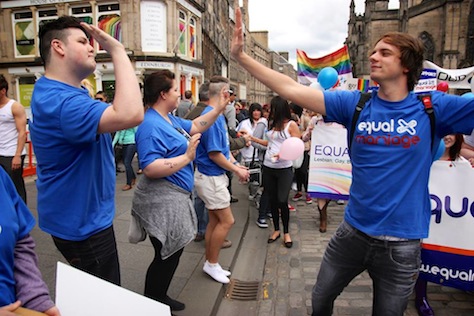Though the UK parliament in Westminster enacted same-sex marriage in July 2013 to great fanfare, the nature of devolution in the United Kingdom meant that Scotland’s parliament in Holyrood would have to pass its own version.![]()
![]()
The devolution process that began in 1997 under Labour prime minister Tony Blair created parliaments for Wales, Scotland and Northern Ireland. But regional devolution ran deepest in Scotland — Wales opted for fewer regional powers than Scotland, and Northern Ireland’s parliament, created as part of the 1998 Good Friday Agreement, spent much of the 2000s suspended. Ironically, that meant that for a brief period, same-sex marriage would be the law of the land in England in Wales, but not in the more socially liberal Scotland.
That changed today, when the Scottish parliament voted 105 to 18 in favor of enacting same-sex marriage. First minister Alex Salmond, who leads a pro-independence government of the Scottish National Party (SNP) fast-tracked the bill to keep pace with Westminster. Though the bill wasn’t without controversy, especially from within the Church of Scotland and other religious groups, support within the Scottish Labour Party and the Scottish Liberal Democrats meant that the bill was always likely to sail through Holyrood.
Though the major opposition to same-sex marriage in England and Wales came from within the Conservative Party of prime minister David Cameron (who himself supported marriage equality), the leader of the Scottish Conservative and Unionist Party, Ruth Davidson (pictured above), is herself gay and strongly supported the marriage equality effort in Scotland. Though the Tories hold just 15 seats in the 129-member Scottish parliament (compared to 65 seats for the SNP and 37 for Labour), Davidson and Cameron have shown that conservatism and marriage equality aren’t necessarily incompatible.
The lengthier Scottish consultation process on the same-sex marriage bill included outreach to hear the views of religious groups, and churches will have the right (though not the obligation) to ‘opt in’ to same-sex marriage in Scotland when the law takes effect later this year. That makes the Scottish same-sex marriage act somewhat stronger than the English version, which provides a blanket ban on same-sex ceremonies within the Church of England.
The first same-sex marriages in England and Wales will take place in March, and the first marriages in Scotland will take place later in autumn 2014.
It also leaves Northern Ireland as the only part of the United Kingdom without same-sex marriage — and as I wrote last summer, don’t expect the Northern Irish assembly at Stormont to take up the cause of LGBT equality anytime soon:
Earlier this year, the Northern Ireland Assembly considered a same-sex marriage bill, but it was defeated in April by a vote of 53 to 42 — a similar motion was defeated in October 2012 by a similar margin. Since 2005, LGBT individuals have been able to enter into civil partnerships (with most, though not all, of the rights of marriage enjoyed by opposite-sex partners) throughout the entire United Kingdom, including Northern Ireland….
Northern Irish politics are entirely different [than in the rest of the United Kingdom], based instead on the largely Protestant ‘unionist’ community and the largely Catholic ‘nationalist’ community. Around 41% of Northern Ireland is Roman Catholic, while around 41.5% of Northern Ireland is Protestant (mostly the Presbyterian Church and the Anglican Church of Ireland). That helps explain why the opposition to gay marriage in Northern Ireland remains so strong, and it doesn’t help that the issue falls along the same lines as the entrenched unionist and nationalist divisions. Given that it’s unlikely either community will come to dominate Northern Irish politics and the Assembly anytime soon, it means that proponents of same-sex marriage will have to convince at least some unionists to join forces with largely supportive nationalist parties to pass a marriage bill — and that may prove a difficult task for a five-way power-sharing government in Belfast that has enough difficulties even without gay marriage.

